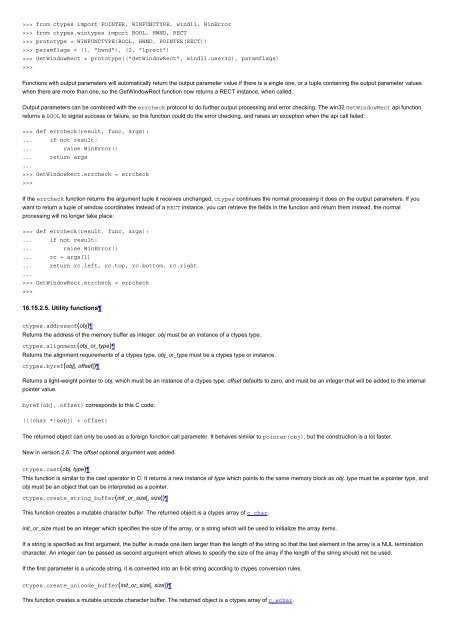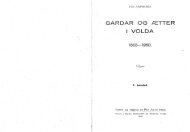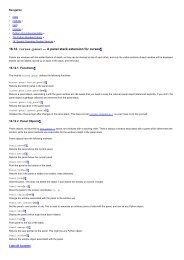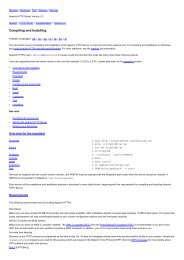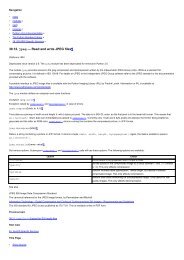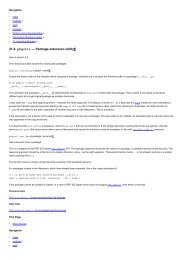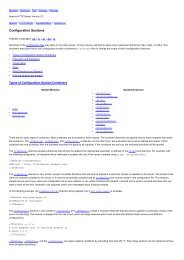16.15. ctypes â A foreign function library for Python â Python v2 ...
16.15. ctypes â A foreign function library for Python â Python v2 ...
16.15. ctypes â A foreign function library for Python â Python v2 ...
Create successful ePaper yourself
Turn your PDF publications into a flip-book with our unique Google optimized e-Paper software.
from <strong>ctypes</strong> import POINTER, WINFUNCTYPE, windll, WinError<br />
>>> from <strong>ctypes</strong>.wintypes import BOOL, HWND, RECT<br />
>>> prototype = WINFUNCTYPE(BOOL, HWND, POINTER(RECT))<br />
>>> paramflags = (1, "hwnd"), (2, "lprect")<br />
>>> GetWindowRect = prototype(("GetWindowRect", windll.user32), paramflags)<br />
>>><br />
Functions with output parameters will automatically return the output parameter value if there is a single one, or a tuple containing the output parameter values<br />
when there are more than one, so the GetWindowRect <strong>function</strong> now returns a RECT instance, when called.<br />
Output parameters can be combined with the errcheck protocol to do further output processing and error checking. The win32 GetWindowRect api <strong>function</strong><br />
returns a BOOL to signal success or failure, so this <strong>function</strong> could do the error checking, and raises an exception when the api call failed:<br />
>>> def errcheck(result, func, args):<br />
... if not result:<br />
... raise WinError()<br />
... return args<br />
...<br />
>>> GetWindowRect.errcheck = errcheck<br />
>>><br />
If the errcheck <strong>function</strong> returns the argument tuple it receives unchanged, <strong>ctypes</strong> continues the normal processing it does on the output parameters. If you<br />
want to return a tuple of window coordinates instead of a RECT instance, you can retrieve the fields in the <strong>function</strong> and return them instead, the normal<br />
processing will no longer take place:<br />
>>> def errcheck(result, func, args):<br />
... if not result:<br />
... raise WinError()<br />
... rc = args[1]<br />
... return rc.left, rc.top, rc.bottom, rc.right<br />
...<br />
>>> GetWindowRect.errcheck = errcheck<br />
>>><br />
<strong>16.15.</strong>2.5. Utility <strong>function</strong>s<br />
<strong>ctypes</strong>.addressof(obj)<br />
Returns the address of the memory buffer as integer. obj must be an instance of a <strong>ctypes</strong> type.<br />
<strong>ctypes</strong>.alignment(obj_or_type)<br />
Returns the alignment requirements of a <strong>ctypes</strong> type. obj_or_type must be a <strong>ctypes</strong> type or instance.<br />
<strong>ctypes</strong>.byref(obj[, offset])<br />
Returns a light-weight pointer to obj, which must be an instance of a <strong>ctypes</strong> type. offset defaults to zero, and must be an integer that will be added to the internal<br />
pointer value.<br />
byref(obj, offset) corresponds to this C code:<br />
(((char *)&obj) + offset)<br />
The returned object can only be used as a <strong><strong>for</strong>eign</strong> <strong>function</strong> call parameter. It behaves similar to pointer(obj), but the construction is a lot faster.<br />
New in version 2.6: The offset optional argument was added.<br />
<strong>ctypes</strong>.cast(obj, type)<br />
This <strong>function</strong> is similar to the cast operator in C. It returns a new instance of type which points to the same memory block as obj. type must be a pointer type, and<br />
obj must be an object that can be interpreted as a pointer.<br />
<strong>ctypes</strong>.create_string_buffer(init_or_size[, size])<br />
This <strong>function</strong> creates a mutable character buffer. The returned object is a <strong>ctypes</strong> array of c_char.<br />
init_or_size must be an integer which specifies the size of the array, or a string which will be used to initialize the array items.<br />
If a string is specified as first argument, the buffer is made one item larger than the length of the string so that the last element in the array is a NUL termination<br />
character. An integer can be passed as second argument which allows to specify the size of the array if the length of the string should not be used.<br />
If the first parameter is a unicode string, it is converted into an 8-bit string according to <strong>ctypes</strong> conversion rules.<br />
<strong>ctypes</strong>.create_unicode_buffer(init_or_size[, size])<br />
This <strong>function</strong> creates a mutable unicode character buffer. The returned object is a <strong>ctypes</strong> array of c_wchar.


